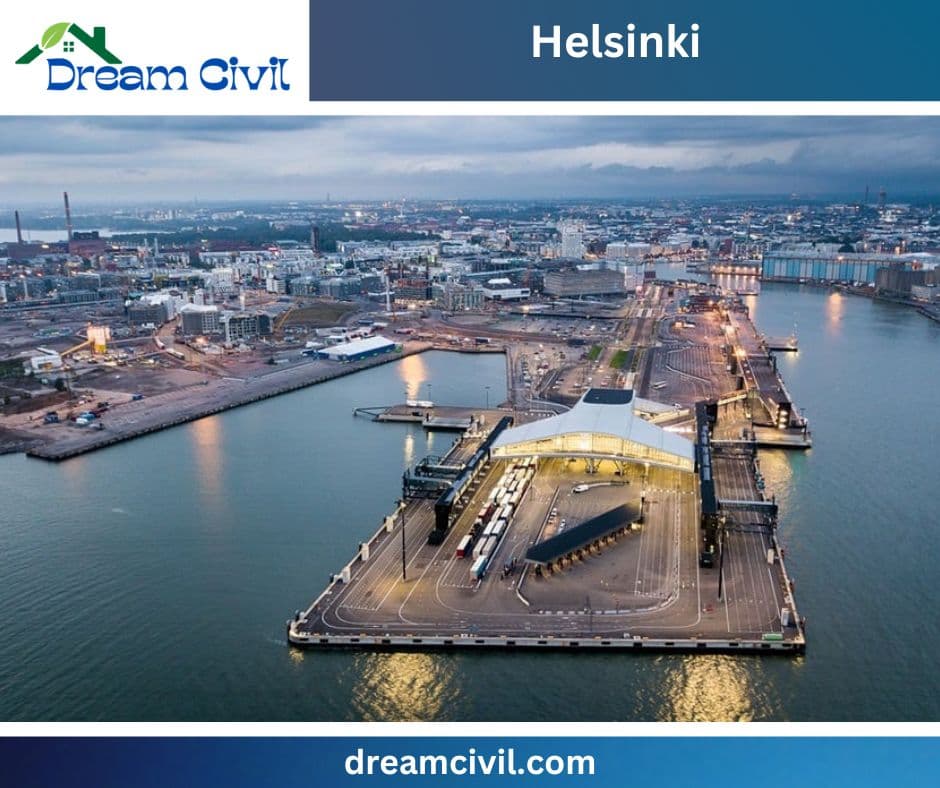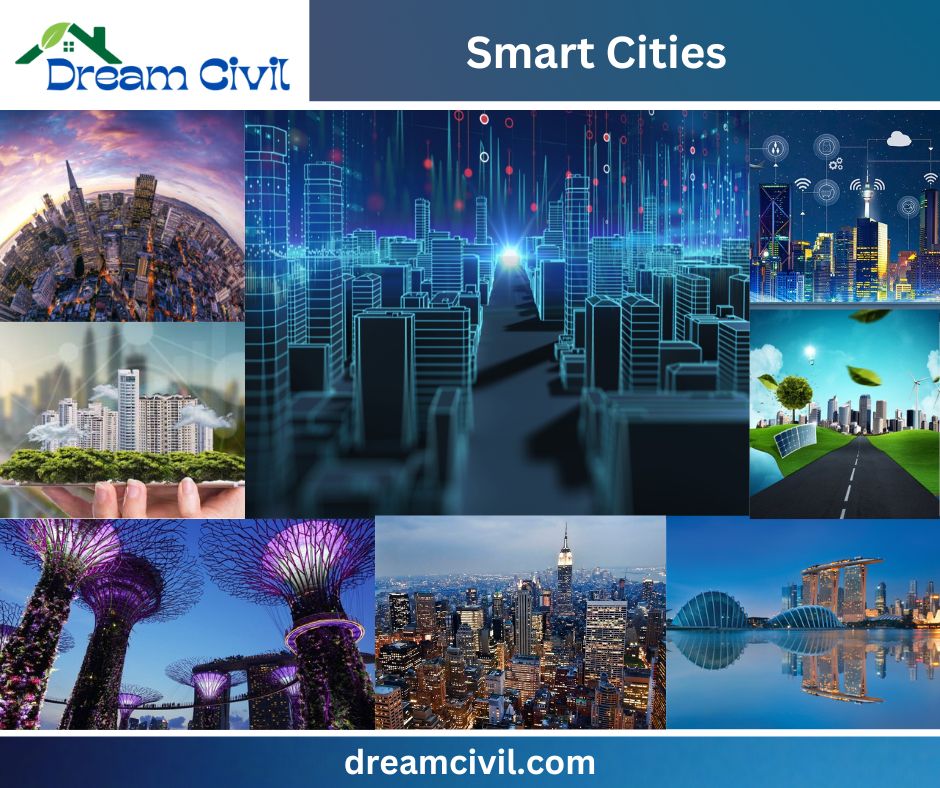Table of Contents
This article presents a fabulous view of the Top 10 Smart cities in the world. Thanks to specialized progress, we can expect to see even more creative and ambitious imaginative city projects. Below are ten of the most incredible intelligent cities worldwide, according to various sources:
10. Stockholm, Sweden

Stockholm, Sweden, is recognized for operating technology and data-driven explanations to sweeten sustainability, urban life, and efficiency. Stockholm’s innovative city features are as follows:
i. Advanced Public Transportation: Stockholm has an exceptionally efficient public transportation system with integrated ticketing and real-time updates for buses, trams, subways, and ferries. Elegant traffic management systems have been executed to miscalculate congestion and enhance traffic flow.
ii. Environmental Sustainability: Stockholm is dedicated to sustainability, with initiatives such as “Vision Zero” for traffic safety and extensive green spaces. The city promotes cycling and electric vehicle adoption through infrastructure and incentives.
iii. Digital Services: Residents can access digital services, including online permits, e-government platforms, and mobile apps that provide city information and services.
iv. Smart Buildings and Infrastructure: Stockholm encourages intelligent building practices, such as energy-efficient construction and IoT-based building management systems. District heating and cooling systems contribute to energy efficiency.
v. Waste Management: Smart bins and waste collection systems optimize garbage collection routes, reducing costs and environmental impact. Recycling and waste reduction programs are also actively promoted.
vi. Education and Innovation: Stockholm fosters innovation by cooperating with research institutions, universities, and tech companies. It has a thriving startup ecosystem and hosts events like Stockholm Tech Fest to showcase innovation.
vii. Digital Healthcare: Stockholm operates electronic medical records, e-health solutions, and telemedicine to sweeten healthcare access and efficiency. Patients can access medical records and book appointments online.
viii. Green Spaces and Parks: The city strongly emphasizes green urban planning, ensuring that parks and recreational areas are easily accessible to residents.
ix. Smart Lighting and Energy Management: The city employs intelligent lighting systems that adjust based on natural light and occupancy, reducing energy consumption. Public buildings and streetlights are equipped with energy-efficient technologies.
x. Water Management: Stockholm manages its water resources efficiently with intelligent systems for monitoring water quality and consumption. The city is proactive in mitigating water-related challenges.
xi. Data Privacy and Security: Stockholm prioritizes data security and privacy to protect residents’ and businesses’ personal information.
xii. Cultural and Social Initiatives: The city uses technology to elevate cultural events and social engagement, sweetening the grade of life for its residents.
xiii. International Collaboration: Stockholm collaborates with other smart cities and participates in global networks to exchange best practices and stay at the forefront of innovative city development.
xiv. Public Safety and Security: Intelligent surveillance and emergency response systems enhance public safety. Stockholm utilizes technology to respond quickly to emergencies and natural disasters.
xv. Inclusive Urban Planning: Stockholm emphasizes inclusive urban planning, ensuring that innovative city initiatives benefit all residents, including those with disabilities and elderly citizens.
In summary, Stockholm has operated technology and sustainability ambitions to transform into an intelligent city, sweetening the life grade for its inhabitants while focusing on environmental conservation and efficiency.
| Read more: What is Rebar in Construction? : Types, Applications, Installation, Repairs, and Safety Practices |
9. Zurich, Switzerland

Zurich, Switzerland, has assembled a great stride in becoming a smart city. Some of the key achievements:
i. Efficient Public Transportation: Zurich has an effective public transportation system, including punctual trams, buses, and trains. Smart ticketing is also utilized to make travel simpler and more efficient.
ii. Sustainable Urban Planning: Zurich prioritizes sustainability in its urban planning, focusing on green spaces, energy-efficient buildings, and reducing emissions.
iii. Clean Energy: Zurich is committed to clean energy production and consumption, promoting clean energy sources.
iv. Digital Governance: Zurich uses digital tools for citizen engagement, e-government services, and data-driven policy-making.
v. Waste Management: Zurich has optimized waste collection through smart bins and recycling programs, creating a cleaner environment.
vi. Education and Innovation: Research and innovation are supported through partnerships with universities and tech industries.
vii. Digital Healthcare: Digital healthcare solutions are implemented in Zurich to improve patient care and streamline healthcare administration.
viii. Smart Lighting: Energy-efficient intelligent lighting systems are utilized in public areas to save energy.
ix. Water Management: Technology efficiently manages water resources while ensuring a sustainable supply.
x. Data Privacy and Security: Data protection and cybersecurity are prioritized in Zurich to safeguard residents’ information.
xi. Public Safety: Smart surveillance and emergency response systems enhance public safety and security.
xii. Cultural and Social Initiatives: Zurich utilizes technology to promote cultural events and social engagement, improving residents’ quality of life.
xiii. International Collaboration: Zurich collaborates with other smart cities to share best practices and stay at the forefront of innovative city development.
These achievements demonstrate how Zurich leverages technology and sustainability practices to improve urban living and efficiency, making it a smart city.
8. Helsinki, Finland

7. Oslo, Norway

6. Barcelona, Spain

5. New York City, USA

New York City has implemented an intelligent city approach to sweeten urban living, efficiency, and sustainability. Its smart city infrastructure comprises various features, including:
i. Public Transportation: NYC has a vast subway system and buses supported by real-time tracking and contactless payment options.
ii. Digital Services: The city offers online government services such as permits and information access, simplifying interactions with the government.
iii. Environmental Sustainability: NYC promotes sustainability through initiatives like green building practices, bike lanes, and programs to reduce emissions.
iv. Smart Infrastructure: The city invests in intelligent infrastructure, such as LED streetlights, utilities based on the Internet of Things, and waste management systems.
v. Innovation Hubs: New York City has many startups, tech hubs, and research institutions that promote invention and entrepreneurship.
vi. Data Analytics: The city uses data analytics for urban planning, traffic management, and crime prevention, improving overall efficiency.
vii. Cultural and Social Initiatives: Technology enhances cultural events, public art installations, and social engagement, enriching the lives of residents.
viii. Digital Healthcare: NYC utilizes digital health resolutions to sweeten patient care, telemedicine, and electronic health records.
ix. Data Privacy and Security: Strong data protection measures are in place to safeguard residents’ personal information.
x. Public Safety: Smart surveillance systems and emergency response technologies enhance public safety and security.
xi. Waste Management: NYC optimizes waste collection with smart bins, recycling initiatives, and waste-to-energy facilities.
xii. International Collaboration: The city cooperates with other towns and elegant experiences in global networks to convey best practices and stay at the forefront of innovative city development.
These points illustrate how New York City influences technology and sustainability measures to sweeten the grade of life for its inhabitants while facilitating environmental conservation and innovation.
4. Copenhagen, Denmark

Copenhagen, Denmark, is a renowned smart city that has successfully implemented numerous sustainable initiatives and technologies. The following are some of the city’s notable features:
i. Biking Culture: Copenhagen is famous for its biking culture, which encourages eco-friendly transportation and decreases traffic congestion.
ii. Renewable Energy: The city invests in renewable energy, including wind and solar power, district heating, and energy-efficient buildings, to become carbon-neutral by 2025.
iii. Smart Transportation: Copenhagen offers efficient public transportation, like a metro system, promotes electric buses, and has an extensive charging station network.
iv. Digital Services: Residents benefit from online permits, digital government services, and simple-to-use platforms for accessing city information through digital services.
v. Sustainable Urban Planning: Copenhagen prioritizes green spaces, pedestrian zones, and eco-friendly architecture in urban development as part of its sustainable urban planning.
vi. Innovation Districts: Copenhagen has districts that foster innovation, such as Copenhagen Science City and the Danish Technological Institute.
vii. Waterfront Development: The city uses intelligent urban planning to revitalize waterfront areas, creating recreational and cultural spaces.
viii. Waste Management: Copenhagen optimizes waste collection with smart bins, recycling programs, and waste-to-energy facilities.
ix. Data Privacy and Security: The city has robust data protection measures to safeguard citizens’ personal information.
x. Public Safety: Smart surveillance systems and emergency response technologies enhance public safety.
xi. Cultural and Social Initiatives: Technology promotes cultural events, social engagement, and public art installations, enriching residents’ lives.
xii. International Collaboration: Copenhagen cooperates with other intelligent cities and experiences in global networks to intercommunication best conventions and advances innovative city development.
These points exemplify how Copenhagen connects technology and sustainability procedures to create an intelligent city that prioritizes the well-being of its citizens, environmental stewardship, and innovation.
3. Amsterdam, Netherlands

London, UK, has executed several innovative city endeavors to enrich urban living, promote sustainability, and increase efficiency. Several key features are highlighted below:
i. Transportation: London has an extensive public transportation system with contactless payment options and real-time tracking for buses and trains.
ii. Environmental Sustainability: The city announces sustainability through varied enterprises, such as congestion cycling infrastructure, pricing, and emissions reduction programs.
iii. Digital Services: London provides convenient online government services and mobile apps for residents to access city information and services.
iv. Smart Infrastructure: London invests in intelligent infrastructure, including energy-efficient buildings, IoT-based utilities, and waste management systems.
v. Cultural and Social Initiatives: Technology is used to promote cultural events, social engagement, and public art installations, enriching the lives of its residents.
vi. Innovation Ecosystem: London supports innovation and startups through tech hubs, accelerators, and initiatives that foster entrepreneurship.
vii. Digital Healthcare: E-health solutions and electronic medical records are leveraged to improve healthcare access and quality.
viii. Data Privacy and Security: The city strongly emphasizes data security and privacy to protect residents’ personal information.
ix. Public Safety: Smart surveillance systems and emergency response technologies enhance public safety and security.
x. Waste Management: London optimizes waste collection with smart bins and recycling programs, reducing environmental impact.
xi. Green Spaces: Extensive green spaces and parks are maintained throughout the city, balancing urban life and nature.
xii. International Collaboration: London cooperates with other intelligent cities and global networks to disseminate best practices and dwell at the forefront of innovative city development.
These initiatives exemplify London’s commitment to incorporating technology and sustainability measures to benefit residents and the environment.
1. Singapore

Singapore is globally acknowledged as an intelligent city that operates technology and data-driven resolutions to sweeten its inhabitants’ quality of life and operational efficiency. Some key areas that emphasize Singapore’s transformation into a smart city:
i. Digital Infrastructure: The city-state has invested considerably in creating a robust digital infrastructure, encompassing high-speed internet access and widespread connectivity. This forms a solid foundation for various intelligent initiatives.
ii. Smart Transportation: Singapore’s well-integrated public transportation system offers real-time tracking and payment options, encourages the use of electric vehicles, and has established EV charging infrastructure.
iii. Urban Planning and Design: Singapore employs data and simulations for urban planning to optimize land use and infrastructure development. The city prioritizes green spaces and sustainable design principles.
iv. Smart Governance: The government leverages data analytics and AI to assemble educated policy decisions and sweeten public services. The “Smart Nation” program underscores citizen hire and digital government services.
v. Efficient Healthcare: Singapore utilizes electronic health records, telemedicine, and wearables to enhance healthcare services. The HealthHub initiative empowers citizens with health information.
vi. Education Technology: Singapore’s education sector employs technology for remote learning, personalized education, and teacher training. The government supports initiatives to develop a skilled workforce in emerging tech fields.
vii. Smart Energy Management: The city promotes energy efficiency and has implemented smart grids to monitor and manage electricity consumption. It also encourages the use of solar panels and green building practices.
viii. Waste Management: Singapore optimizes waste collection through sensors and data analytics, reducing costs and environmental impact. The city has recycling and sustainability programs in place.
ix. Safety and Security: Singapore uses philosophical surveillance systems and analytics to enrich public safety. Emergency kindnesses have access to real-time data and technology for quick comeback.
x. Smart Water Management: Singapore employs technology to ensure a sustainable water supply. Sensors monitor water quality and consumption.
xi. Tourism and Hospitality: Singapore’s tourism industry incorporates intelligent technologies, offering tourists convenient services like virtual tours and mobile apps.
xii. Innovation Ecosystem: Singapore has created a passionate ecosystem for startups and creation, attracting tech talent and investment. It hosts events like the Singapore FinTech Festival to facilitate innovation in finance and beyond.
xiii. Sustainability Initiatives: Singapore promotes sustainable practices like vertical farming and green building standards. Initiatives like the “Zero Waste Masterplan” aim to reduce waste and encourage recycling.
xiv. Data Privacy and Security: Singapore strongly emphasizes data protection and cybersecurity to ensure the safety and privacy of its citizens’ data.
xv. International Collaboration: Singapore cooperates with other elegant cities and international organizations to intercommunication the most pleasing practices and stay at the vanguard of innovative city development.
These points affirm Singapore’s adoption of technology and data-driven resolutions to transform into a brilliant city, improving the well-being of its tenants and the overall efficiency of its procedures.


